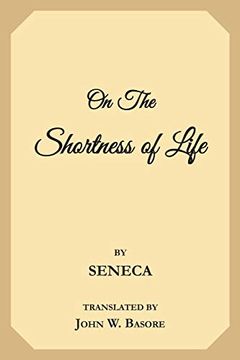Reseña del libro "On the Shortness of Life: Life is Long if you Know how to use it (en Inglés)"
THE BOOK"On the Shortness of Life" (De Brevitate Vitae) is a moral essay written by Seneca the Younger, a Roman Stoic philosopher, sometime around the year 49 AD, to his father-in-law Paulinus. The philosopher brings up many Stoic principles on the nature of time, namely that people waste much of it in meaningless pursuits.According to the essay, nature gives man enough time to do what is really important and the individual must allot it properly. In general, time can be best used in the study of philosophy, according to Seneca. THE AUTHORAs "a major philosophical figure of the Roman Imperial Period", Seneca 's lasting contribution to philosophy has been to the school of Stoicism. His writing is highly accessible and was the subject of attention from the Renaissance onwards by writers such as Michel de Montaigne. He has been described as "a towering and controversial figure of antiquity" and "the world 's most interesting Stoic".Seneca wrote a number of books on Stoicism, mostly on ethics, with one work (Naturales Quaestiones) on the physical world. Seneca built on the writings of many of the earlier Stoics: he often mentions Zeno, Cleanthes, and Chrysippus; and frequently cites Posidonius, with whom Seneca shared an interest in natural phenomena. He frequently quotes Epicurus, especially in his Letters. His interest in Epicurus is mainly limited to using him as a source of ethical maxims. Likewise Seneca shows some interest in Platonist metaphysics, but never with any clear commitment. His moral essays are based on Stoic doctrines, Stoicism was a popular philosophy in this period, and many upper-class Romans found in it a guiding ethical framework for political involvement. It was once popular to regard Seneca as being very eclectic in his Stoicism, but modern scholarship views him as a fairly orthodox Stoic, albeit a free-minded one.His works discuss both ethical theory and practical advice, and Seneca stresses that both parts are distinct but interdependent.WORKSWorks attributed to Seneca include a dozen philosophical essays, one hundred and twenty-four letters dealing with moral issues, nine tragedies, and a satire, the attribution of which is disputed.Seneca's TragediesTragedies with Greek subjects: - The Madness of Hercules- The Trojan Women- The Phoenician Women- Medea- Phaedra- Oedipus- Agamemnon- ThyestesEssaysEssays Traditionally given in the following order: 1. On Providence - addressed to Lucilius2. On the Firmness of the Wise Person - addressed to Serenus3. On Anger - A study on the consequences and the control of anger - addressed to his brother Novatus4. To Marcia, On Consolation - Consoles her on the death of her son5. On the Happy Life - addressed to Gallio6. On Leisure - addressed to Serenus7. On Tranquillity of Mind - addressed to Serenus8. On the Shortness of Life - Essay expounding that any length of life is sufficient if lived wisely - addressed to Paulinus9. To Polybius, On Consolation - Consoling him on the death of his brother.10. To Helvia, On Consolation - Letter to his mother consoling her on his absence during exile.Other Essays- On Clemency - written to Nero on the need for clemency as a virtue in an emperor.- On Benefits [seven books]- On Superstition - lost, but quoted from in Saint Augustine's City of God 6.10-6.11.

